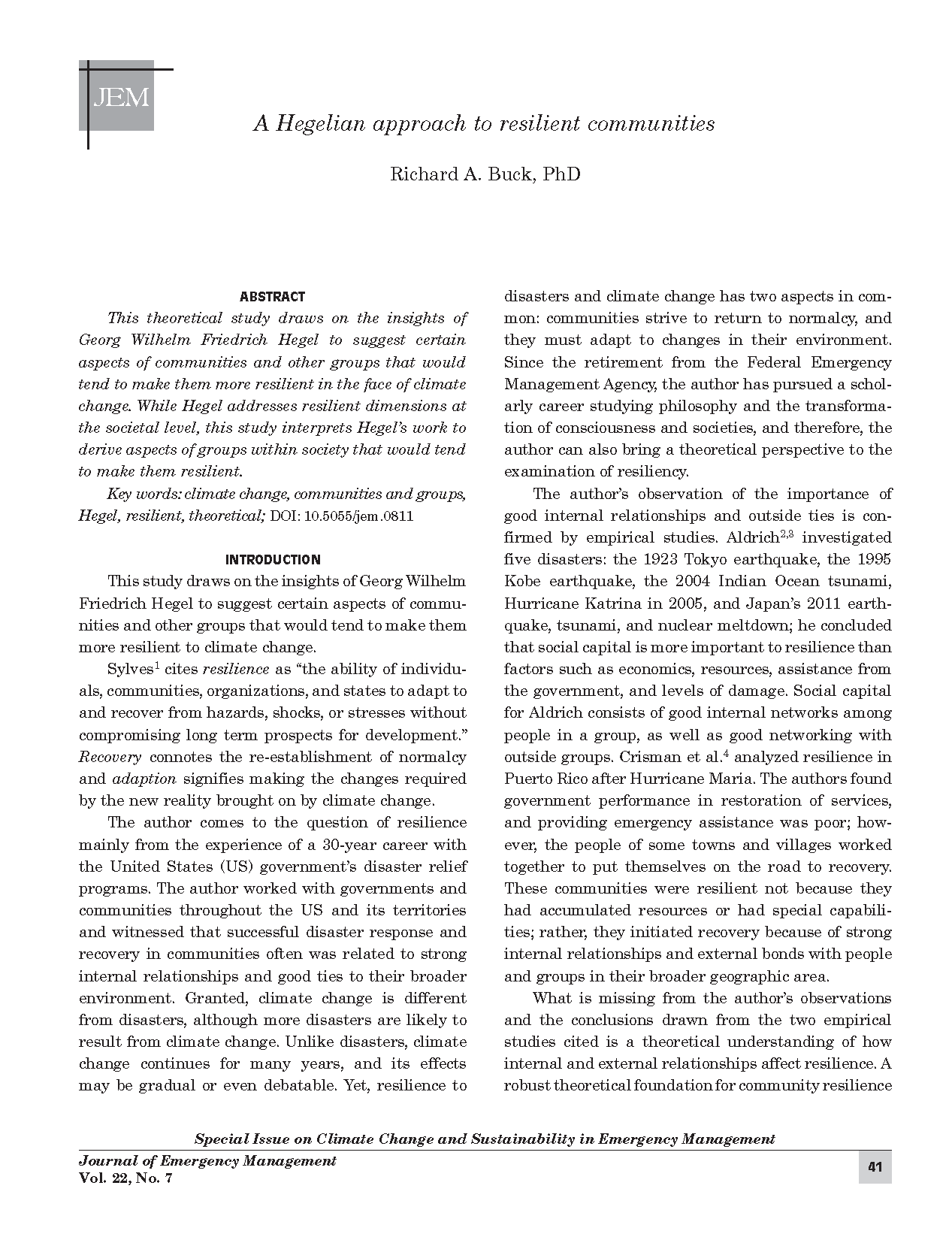A Hegelian approach to resilient communities
DOI:
https://doi.org/10.5055/jem.0811Keywords:
climate change, communities and groups, Hegel, resilient, theoreticalAbstract
This theoretical study draws on the insights of Georg Wilhelm Friedrich Hegel to suggest certain aspects of communities and other groups that would tend to make them more resilient in the face of climate change. While Hegel addresses resilient dimensions at the societal level, this study interprets Hegel’s work to derive aspects of groups within society that would tend to make them resilient.
References
Sylves R: Disaster Policy & Politics: Emergency Management and Homeland Security. 3rd ed. London: CQ Press, 2020: 443.
Aldrich DP: Building Resilience: Social Capital in Post-Disaster Recovery. Chicago: University of Chicago Press, 2012. DOI: https://doi.org/10.7208/chicago/9780226012896.001.0001
Aldrich D: Black Wave: How Networks and Governance Shaped Japan’s 3/11 Disasters. Chicago: University of Chicago Press, 2019. DOI: https://doi.org/10.7208/chicago/9780226638577.001.0001
Crisman TL, Dumke D, Rivera FI, et al.: Resilience of environment, infrastructure, communities, and government in Puerto Rico after Hurricane Maria and the need for community empowerment to develop decentralized, nature-based solutions to sustainability. J Emerg Manag. 2021; 19(8): 11-23. DOI: https://doi.org/10.5055/jem.0608
Hegel GW: Phenomenology of Spirit (A.V. Miller, Trans.). New York: Oxford University Press, 1977 (Original work published 1807).
Hegel GW: Elements of the Philosophy of Right (A.W. Wood, Ed. and H.B. Nisbet, Trans.). New York: Cambridge University Press, 1991 (Original work published in 1821). DOI: https://doi.org/10.1017/CBO9780511808012
Pelczynski ZA: Introduction: The significance of Hegel’s separation of the state and civil society. In Pelczynski ZA (ed.): The State and Civil Society: Studies in Hegel’s Political Philosophy. Cambridge, UK: Cambridge University Press, 1984: 1-11.
Kojève A: Introduction to the Reading of Hegel (J.H. Nichols Jr., Trans.). Ithaca, NY: Cornell University Press, 1969 (Original work published 1947).
Page SE: The Difference: How the Power of Diversity Creates Better Groups. Princeton, NJ: Princeton University Press, 2007. DOI: https://doi.org/10.1515/9781400830282
Keltner D: The Power Paradox. New York: Penguin Press, 2016: 1.
Pelczynski ZA: Nation, civil society, state: Hegelian sources of the Marxian non-theory of nationality. In Pelczynski ZA (ed.): The State and Civil Society: Studies in Hegel’s Political Philosophy. Cambridge, UK: Cambridge University Press, 1984: 262-278.
Harris EE: Hegel’s theory of sovereignty, international relations, and war. In Stepelevich LS (ed.): Selected Essays on G.W.F. Hegel. Atlantic Highland, NJ: Humanities Press International, 1993: 104-119.

Published
How to Cite
Issue
Section
License
Copyright 2007-2025, Weston Medical Publishing, LLC and Journal of Emergency Management. All Rights Reserved.
Leave Nobody Behind: Emergency Management in a More Inclusive Way is a trademark of Journal of Emergency Management





